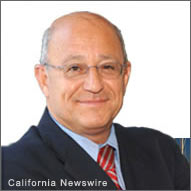SACRAMENTO /California Newswire/ — Assemblymember Pedro Nava (D-Santa Barbara), Chair of the Assembly Banking & Finance Committee, held an informational hearing today to examine the interchange fee system and the impact of undisclosed interchange fees charged to California consumers and merchants on every credit or debit card transactionÂal cost estimated at nearly $48 billion in 2008 nationwide. At the hearing, the Committee heard testimony from various stakeholders in hopes of providing the California Legislature with the necessary information to bring about changes to benefit consumers.
 Chairman Nava said, “With the price of gas at more than $3 a gallon, credit card companies and their banks who sponsor gasoline credit cards are collecting as much as 8 cents per gallon for interchange fees. We need to examine our options to lower these fees and pass the savings on to California’s struggling consumers.â€
Chairman Nava said, “With the price of gas at more than $3 a gallon, credit card companies and their banks who sponsor gasoline credit cards are collecting as much as 8 cents per gallon for interchange fees. We need to examine our options to lower these fees and pass the savings on to California’s struggling consumers.â€
A September 25, 2005, Washington Post article entitled, “Credit Card Companies Are Filling Up at the Station,” reported that credit card companies made an additional 2.2 billion dollars on the back of consumers due to rising fuel prices between September, 2004 and September, 2005.
7-Eleven stores across the country last year collected more than 1.6 million signatures urging Congress to address interchange fees. In response, Congressmen Peter Welch (D-VT) and Bill Shuster (R-PA) introduced HR 2382, the Credit Card Interchange Fees Act of 2009. Additionally, Senators Richard Durbin (D-IL) introduced S. 1212 and Congressmen Conyers (D-MI) introduced HR 2695, The Credit Card Fair Fee Act of 2009, which will allow merchants to negotiate interchange fees.
“Interchange fees inflate the cost of nearly everything consumers buy, even when they pay cash. American families pay an average of $427 a year on interchange fees,” said Chairman Nava. “My goal is to walk away from the hearing today with a better understanding as to why credit card companies and banks think this is fair and, in addition, find a way to pass cost savings on to California consumers.”
A recent study, released by The Hispanic Institute concluded that the current structure of the credit card system requires lower income and disproportionate numbers of minority consumers to transfer billions of dollars to higher income and disproportionate numbers of non-minority consumers. In addition, the study found the credit card industry ensures that the top 10% of Americans get at least $354 million in frills while the bottom tier pays at least $669 million more than they should
At today’s hearing Chairman Nava heard testimony from representatives from the U.S. Government Accountability Office, Center for American Progress, consumer organizations, California Credit Union League, community banks, Food Marketing Institute, Small Business California, a 7-Eleven owner, a bookstore owner and the National Retail Federation.
